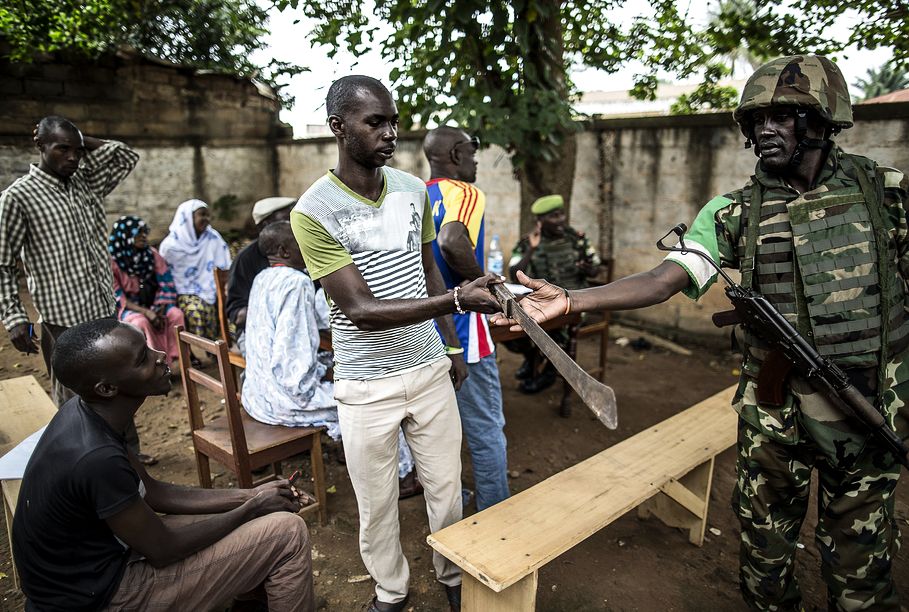UN confirms: Attack on Bangladeshi-Pakistan convoy took place Thurs in #Bangui, 1 Pakistani officer killed, 7 other injured #CARcrisis
— Peter Bouckaert (@bouckap) October 10, 2014
Violence in Bangui: "Anything is possible" said Gaye, head of UN Mission http://t.co/6IGd9jS6Aa #CARcrisis
— UNICEF CAR (@UNICEF_CAR) October 10, 2014
A convoy of Pakistani-Bangladeshi UN peacekeepers was attacked in the Central African Republic yesterday [9 October], leaving one Pakistani officer dead and seven other soldiers injured.
The soldier died in an ambush in the capital of Bangui and is the first casualty in the new United Nations-led Mission for the Stabilisation of the Central African Republic (MINUSCA) since it began in September.
The head of the UN Mission, Lieutenant General Babacar Gaye, has "strongly condemned" the attack on the convoy.
However, the surrounding fighting did not disrupt Vejonis' and General Graube’s official schedule of visits with CAR government officials or with the commanders of the EU operation in support of the UN peace-keeping mission there.
Kaut arī ielās nemieri,prezidente Sambu-Panzu atrada laiku,lai runātu par ES (arī LV) atbalstu miera uzturēšanai CĀR pic.twitter.com/MPnXQNSpHa
— Raimonds Vejonis (@Vejonis) October 9, 2014
Tikšanās ar EUFOR RCA komandieri brģen.Thierry Lion. Iepazīstina ar drošības situāciju. pic.twitter.com/87nPWuIRQ6
— Raimonds Vejonis (@Vejonis) October 9, 2014
In an official UN statement, MINUSCA leader Lieutenant General Gaye said: "The United Nations is a non-partisan organisation, and we will work with all actors to fulfil our aims, to promote peace and reconciliation in the Central African Republic, reported the International Business Times Friday.
"But we will continue to take robust action against criminal elements who threaten civilians. I pay tribute to MINUSCA's police and military units who, working closely with the Central African authorities and alongside EUFOR [European Union Force] and Sangaris forces, are preventing a very difficult situation from spiralling out of control."
Fierce clashes between the two warring militias, the Anti-Balaka and Seleka, broke out in Bangui on the evening of 7 October, leaving up to 12 dead and 21 injured. It is believed the violence erupted after a Muslim man was lynched and then beheaded by a mob in Bangui, after he reportedly tried to hurl a grenade into the crowd.
A revenge attack was later carried out by Seleka rebels on a Christian taxi driver, sparking riots in the capital.
The Central African Republic has been mired in violence since March 2013, when President François Bozize was forced to flee the country after Seleka rebels seized the capital.
Following a nine-month period of intense violence between the Muslim minority Seleka rebels and the non-Muslim anti-Balaka fighters, Seleka leader and self-declared President Michel Djotodia was forced to resign on 10 January 2014, after heavy international pressure.
Djotodia was replaced by an interim president, Catherine Samba-Panza, in late January 2014. There have been angry calls for Samba-Panza to step down over allegations of corruption and mismanagement.
Fears are also growing that Samba-Panza might try and run for the presidency in next year's elections, despite not being allowed.
Some 12,000 UN Security forces are now operating in the country, with around 1,200 Pakistani and Bangladeshi soldiers being used as peacekeepers since the MINUSCA mission started in September.


























